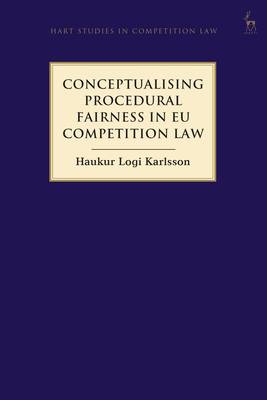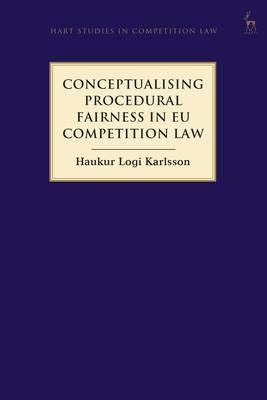
- Afhalen na 1 uur in een winkel met voorraad
- Gratis thuislevering in België vanaf € 30
- Ruim aanbod met 7 miljoen producten
- Afhalen na 1 uur in een winkel met voorraad
- Gratis thuislevering in België vanaf € 30
- Ruim aanbod met 7 miljoen producten
Zoeken
Omschrijving
What constitutes a fair procedure when it comes to EU competition law?
This innovative book seeks to understand the philosophical considerations at the core of conflicting procedural fairness arguments in EU competition law practice. The author argues for a conceptualisation of procedural fairness as a distributional issue that can be solved by a practical fairness theory and a comprehensive methodology. To illustrate the usefulness of the conceptualisation, three procedural fairness problems from recent EU competition law practice are analysed: - the KME-Chalkor cases;- the Groupe Gascogne cases;
- the regulatory question about using a collective redress mechanism for private enforcement of EU competition law. This unique approach provides a robust philosophical and methodological foundation for arguing about a wide range of procedural fairness dilemmas. The book is a must-read for academics and practitioners seeking an imaginative perspective on the philosophical foundations of arguments about procedural fairness in EU competition law and beyond.
Specificaties
Betrokkenen
- Auteur(s):
- Uitgeverij:
Inhoud
- Aantal bladzijden:
- 192
- Taal:
- Engels
- Reeks:
Eigenschappen
- Productcode (EAN):
- 9781509944583
- Verschijningsdatum:
- 24/03/2022
- Uitvoering:
- Paperback
- Formaat:
- Trade paperback (VS)
- Afmetingen:
- 156 mm x 234 mm
- Gewicht:
- 276 g

Alleen bij Standaard Boekhandel
+ 179 punten op je klantenkaart van Standaard Boekhandel
Beoordelingen
We publiceren alleen reviews die voldoen aan de voorwaarden voor reviews. Bekijk onze voorwaarden voor reviews.







